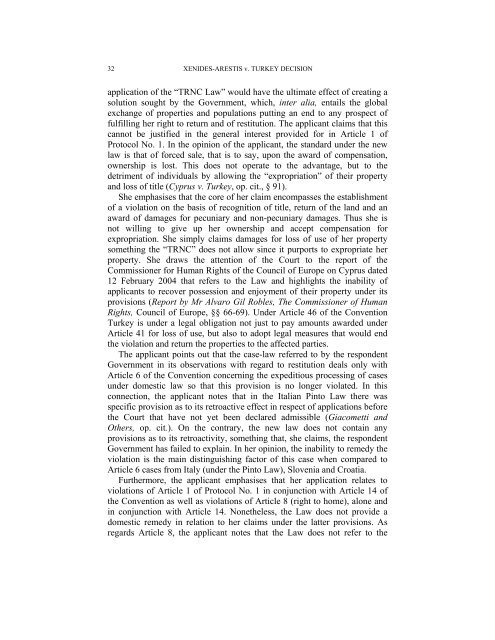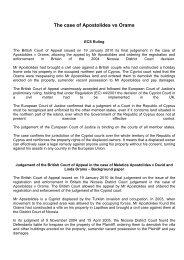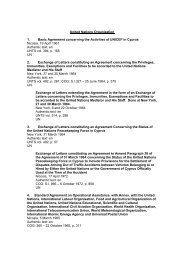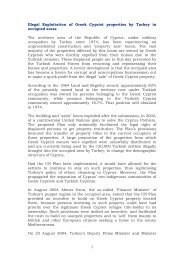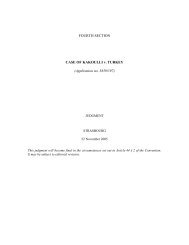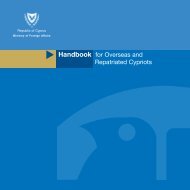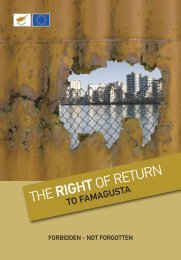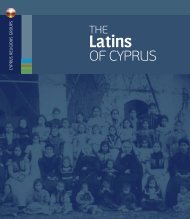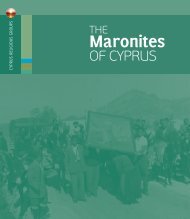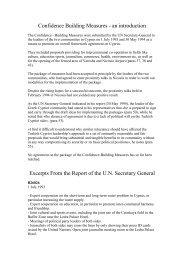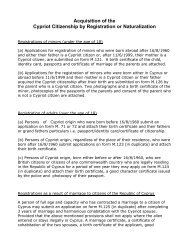Myra Xenides- Arestis v. Turkey
Myra Xenides- Arestis v. Turkey
Myra Xenides- Arestis v. Turkey
Create successful ePaper yourself
Turn your PDF publications into a flip-book with our unique Google optimized e-Paper software.
32 XENIDES-ARESTIS v. TURKEY DECISIONapplication of the “TRNC Law” would have the ultimate effect of creating asolution sought by the Government, which, inter alia, entails the globalexchange of properties and populations putting an end to any prospect offulfilling her right to return and of restitution. The applicant claims that thiscannot be justified in the general interest provided for in Article 1 ofProtocol No. 1. In the opinion of the applicant, the standard under the newlaw is that of forced sale, that is to say, upon the award of compensation,ownership is lost. This does not operate to the advantage, but to thedetriment of individuals by allowing the “expropriation” of their propertyand loss of title (Cyprus v. <strong>Turkey</strong>, op. cit., § 91).She emphasises that the core of her claim encompasses the establishmentof a violation on the basis of recognition of title, return of the land and anaward of damages for pecuniary and non-pecuniary damages. Thus she isnot willing to give up her ownership and accept compensation forexpropriation. She simply claims damages for loss of use of her propertysomething the “TRNC” does not allow since it purports to expropriate herproperty. She draws the attention of the Court to the report of theCommissioner for Human Rights of the Council of Europe on Cyprus dated12 February 2004 that refers to the Law and highlights the inability ofapplicants to recover possession and enjoyment of their property under itsprovisions (Report by Mr Alvaro Gil Robles, The Commissioner of HumanRights, Council of Europe, §§ 66-69). Under Article 46 of the Convention<strong>Turkey</strong> is under a legal obligation not just to pay amounts awarded underArticle 41 for loss of use, but also to adopt legal measures that would endthe violation and return the properties to the affected parties.The applicant points out that the case-law referred to by the respondentGovernment in its observations with regard to restitution deals only withArticle 6 of the Convention concerning the expeditious processing of casesunder domestic law so that this provision is no longer violated. In thisconnection, the applicant notes that in the Italian Pinto Law there wasspecific provision as to its retroactive effect in respect of applications beforethe Court that have not yet been declared admissible (Giacometti andOthers, op. cit.). On the contrary, the new law does not contain anyprovisions as to its retroactivity, something that, she claims, the respondentGovernment has failed to explain. In her opinion, the inability to remedy theviolation is the main distinguishing factor of this case when compared toArticle 6 cases from Italy (under the Pinto Law), Slovenia and Croatia.Furthermore, the applicant emphasises that her application relates toviolations of Article 1 of Protocol No. 1 in conjunction with Article 14 ofthe Convention as well as violations of Article 8 (right to home), alone andin conjunction with Article 14. Nonetheless, the Law does not provide adomestic remedy in relation to her claims under the latter provisions. Asregards Article 8, the applicant notes that the Law does not refer to the


